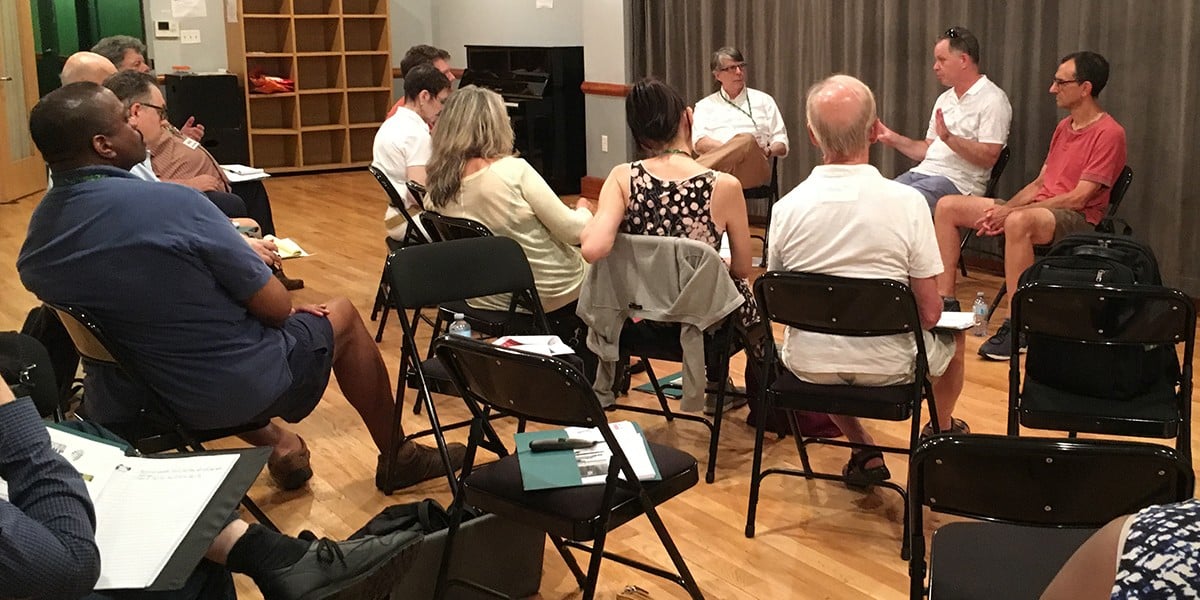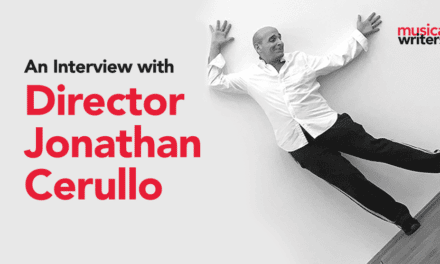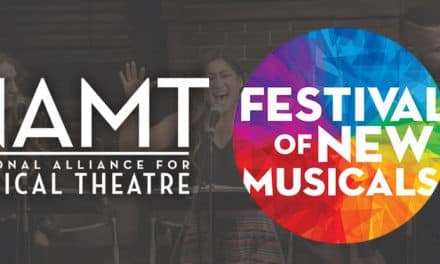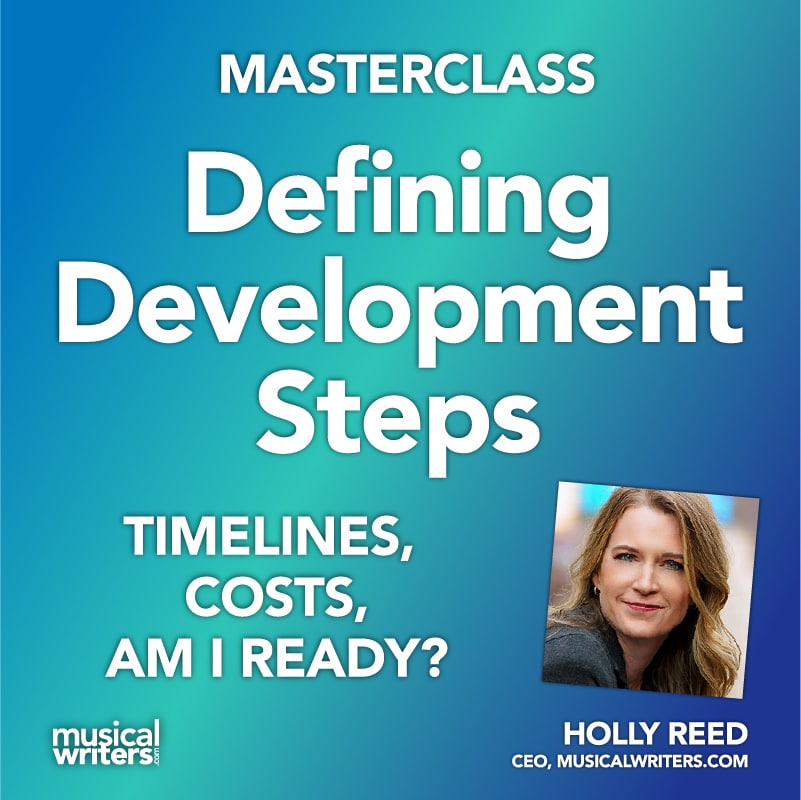Insights from TRU’s Recent Weekend Intensive on Producing a Musical Showcase
Surround yourself with a great team so they can be your other eyes when you can’t be everywhere.
~John Lant
Seeing your show behind the footlights is a great dream but not a simple one. There’s always a journey and always much to learn about moving a musical toward a commercial or nonprofit run, whether through an industry reading, musical showcase, festival, off-off-Broadway, or off-Broadway production.
After listening to New York theatre industry people at the annual summer Theater Resources Unlimited (TRU) “Producer Bootcamp, Weekend Intensive for Musical Showcase Producing,” I came away with detailed notes and valuable perspectives to share on producing your show. Most of the attendees at the workshop were writers wanting to self-produce or get their show staged one way or another, and so the speakers aimed their comments for writers, not for those seeking to be professional producers. TRU’s Executive Director Bob Ost led the Intensive and provided insights along the way.
Here are some of my favorite points from the two-day Intensive that may be generally helpful:
1. The more you learn about producing a show, the better partner you will be for a producer.
If you dream of finding a producer for your new musical, learn as much as you can about their concerns. This was a key message from Patricia Klausner, a Tony Award-winning producer for The Band’s Visit and the Pippin revival. Writers who know show business ins and outs can respond more effectively to a producer’s messages and may be favored by producers over show business novices.
A related point about producer-writer relationships is that the writing team should keep the pulse of a show’s readiness for each phase of development. A producer might suggest a showcase production to see a show on its feet, but writers may feel they need another reading to inspire their rewrites before serious money is spent.
Here are a few ways you can learn more about the producer’s world (and these are also possible ways to find producers): MusicalWriters.com provides developmental coaching and guidance through the MusicalWriters Development Program. You can also consider the programs of TRU, the Commercial Theatre Institute, the Biz of Musical Theatre Biz run by NMI in Los Angeles, Business of Broadway and Ken Davenport’s conferences and programs. It may also be wise to find a mentor. TRU has a Producer Development and Mentorship Program that can provide ongoing guidance.
2. What you put your name on is how you will be remembered.
Patricia Klausner and others emphasized this point, which is applicable on many levels. In a complex world, we’ve become accustomed to branding and to segregating entertainment in genres, themes, and styles. This means it’s important to cultivate your sensibilities and represent those in your work from the beginning—consider are you mainly comic or serious; do you like challenging the audience with contemporary issues, or what? Klausner suggested that you create a personal mission statement as the basis of your creative efforts so that you can be aligned with it as you move forward. Also, as you refine your “elevator pitch” and any statements about your show, remember you will be repeating them again and again, so they should suit who you are.
The Bootcamp Intensive group heard from four-time Tony Award winner producer Cheryl Wiesenfeld (Vanya & Sonia & Masha & Spike, Porgy & Bess, All the Way, Elaine Stritch: At Liberty). She recommended exploring what you are naturally attracted to as the basis for show content and self-producing decisions. Know what your passions are. Wiesenfeld spoke about how the theatre business is a small world, especially the New York theatre community where most commercial productions spend some time. It is said there are only two degrees of separation between anyone in the business. So, as Klausner also noted, what you put out (both content and behavior) is how you will be known.
3. You may only have one shot at grabbing the attention of a producer.
Patricia Klausner suggests that you err on the side of caution when planning a reading or musical showcase. Assume you only have one shot at making an impression. You have a responsibility to people whose time you are taking. If you invite a producer to a rough developmental reading, don’t assume that they will want to come again to a more refined presentation.
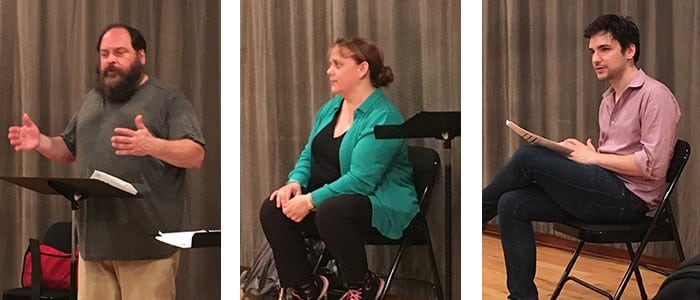
John Lant, Jamibeth Margolis, and Evan Bernardin give insight into producing your show at the TRU Boot Camp for Showcase Producing.
4. Work through the legal and account-keeping structures in advance.
At the Intensive, we heard from several people who recommended the formation of a Limited Liability Company for the writer and even possibly for the show itself. For legalities and finances, writers will want to keep things separate from their personal assets. Entertainment attorney Lee Feldshon said that an LLC can enhance credibility through inspiring a perception of professionalism and a higher level of seriousness. He also advocated LLC formation for the limitation of liabilities, the greater flexibility over a corporation structure, and no double taxation. Some people create separate LLCs for each show so that each financial bucket is kept isolated from the other.
To form an LLC, you can use LegalZoom or some other approach. Anyone producing in New York needs either a New York LLC or authorization for operating in the state.
Feldshon also recommended that before a production, a show team should have a bank account, an attorney, and an accountant. He and others said don’t co-mingle funds and don’t use your personal credit card for financing.
Entertainment attorney Eric Goldman spoke to the group about contracts, rights, and more. He noted that “Everything is a negotiation,” which is why hiring an attorney is a good idea so you can keep “good legal hygiene.” For anyone not working alone on a show, a collaboration agreement can save you from headaches later. Before moving forward with a producer, always work through the options agreement that includes subsidiary rights and other key details.
Lee Feldshon at FeldshonLaw.com
Eric S. Goldman on LinkedIn
5. Plan far in advance and find someone to oversee a thousand details.
Several speakers described production-related specifics that require attention. We heard from general manager Evan Bernardin of Evan Bernardin Productions, producers John Lant and Jeremy Handelman, and financial consultant Bailie Slevin about making plans and things that could go wrong.
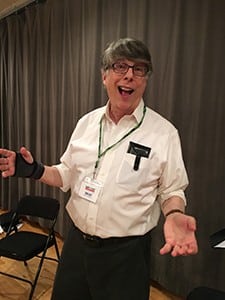
Bob Ost at the TRU Boot Camp on Showcase Producing
One obvious but important piece of advice is to set up a calendar far in advance. It should include schedules for such things as drafting a budget, signing a contract with your venue and ticket agent, hiring a director and casting director, hiring other team members, production meetings and rehearsals, publicity, etcetera.
People in the know like Bob Ost or a general manager can advise on timing, for example, everyone is too busy to attend something in May during awards season so don’t schedule anything then in New York. For a professional musical showcase, Ost suggests coming up with a tentative time for your production but be flexible, as your preferred venue may have limited availability. He also commented, “Start considering how much you have to spend, or how you will find the money; a year out gives you time to do crowdsourcing or whatever form of raising money you can do.”
If you are doing a New York reading or showcase, it would help to hire a general manager or an executive producer if you haven’t found a producer.
Here are some people who can help:
https://www.evanbernardinproductions.com/
https://www.cfsllc.com/team/bailie-slevin
(John Lant meets writers through TRU’s writer-producer speed dates.)
6. Wording matters when raising funds, etc. for musical showcase producing
Development stages require sensitivity to wording. For example, if you’re holding a 29-hour reading, don’t call it a backers’ audition. It’s an “Industry reading.” When you are asking for money from potential supporters of your show, don’t call it “investing” in the show unless you’ve worked through the legal regulations involving investments.
To have “donations” count as a tax deduction, you probably need to work with a nonprofit theatre or a fiscal sponsor such as Fractured Atlas or TRU.
You can solicit outright “contributions” or “gifts” from supporters. What you can offer back (in addition to possible attendance at the performance) as an incentive could range from mugs and t-shirts, to a Thank You in printed program, to letting them sponsor a character and have them meet the actor. Be careful not to promise something that will be cost prohibitive.
You can also solicit trades of goods and services in exchange for advertising in a printed program.
7. Hiring a casting director can aid your vision of characters.
Casting directors not only do a lot of practical work, they may bring unexpected nuances to a show. Jamibeth Margolis, who is in her 20th year as a professional casting director in New York, explained the multiple benefits of hiring a professional. Casting directors can schedule auditions and callbacks, find the audition space and accompanist, filter through hundreds of submissions, and invite actors they’ve seen before. This takes the burden off the director.
As a show creator, you can decide what material actors will perform at an audition. Casting directors can expand your ideas for roles by using their creativity in their audition invitations, and the hired actors may give performances that expand the role. http://www.castingsociety.com/members/jamibeth-margolis
8. Surround yourself with a great team and don’t wear every hat at once.
When producing a musical showcase, or any production, writers should wear the producer and writer hat at separate times, says Ost. This advice also applies to composers who can’t be the music director and, at the same time, evaluate their work from the back of the audience. Focus is essential.
Lastly, it takes a village to produce a show. John Lant said, “Surround yourself with a great team so they can be your other eyes when you can’t be everywhere.” He was speaking about a production team, but the idea is true on all levels, from collaborators to producers, from designers to interns. If you’re not in New York City getting to know who does what well, hire someone who does, like Bob Ost who can make connections with key personnel. Ost and others you meet at TRU programs can help you formulate goals and a plan of action. TRUonline.org

